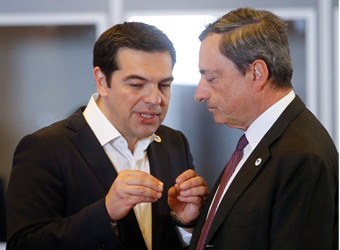European Central Bank President Mario Draghi has voiced unprecedented doubts about the chances of rescuing Greece from bankruptcy as Greek Prime Minister Alexis Tsipras was due to put forward last-ditch reform proposals on Thursday.
Italian daily Il Sole 24 Ore quoted the ECB chief, under growing fire in Germany for keeping Greek banks afloat, as saying he was not sure a solution would be found for Greece and he did not believe Russia would come to Athens’ rescue.
Asked if a deal to save Greece could be wrapped up, Draghi told the paper as he was boarding a plane in Brussels on Wednesday: “I don’t know, this time it’s really difficult.”
The ECB is keeping shuttered Greek banks afloat with emergency liquidity capped until the weekend as leaders of the 19-nation euro zone race to find a last-minute third bailout for Athens.
Asked if he expected Russian President Vladimir Putin to help Greece, Draghi said: “I don’t believe so, I don’t see it as a real risk … and then, they don’t have money themselves.”
The usually discreet central banker was speaking after an emergency euro zone summit on Tuesday gave Greece five days to come up with a credible plan to repair its public finances and reform its economy or face an economic meltdown and possible exit from Europe’s common currency.
Under that timetable, the leftist Greek government, which formally applied on Wednesday for a three-year loan from the European Stability Mechanism bailout fund, has until midnight to present convincing, detailed reform proposals.
International Monetary Fund chief Christine Lagarde added a potential complication by insisting that any deal must include a restructuring to make Greece’s massive debt pile sustainable.
Speaking in Washington on Wednesday, Lagarde said that to address Greece’s acute crisis any deal needed to have two legs. One was structural reforms and fiscal consolidation.
“The other leg is debt restructuring, which we believe is needed in the case of Greece for it to have debt sustainability,” she said.
Germany, Athens’ biggest creditor, has said any debt write-off would be illegal under the EU treaty and has also taken a restrictive approach to reprofiling Athens’ official borrowings to ease the short-term pressure of debt service.
Even France, Greece’s strongest support in the euro zone, acknowledged on Thursday it was working on scenarios for a Greek exit from the currency area if weekend efforts to clinch a deal fail.
“We would be irresponsible if we did not consider this question. So we are thinking about it because it’s our duty to be ready for any eventuality, but it’s not what we want,” French Finance Minister Michel Sapin told LCI television.
TSIPRAS SEEKS CONSENSUS
According to the Athens daily Kathimerini, Greece is planning a reform package worth 12 billion euros over two years, more than previously planned to offset a return to recession after months of difficult negotiations with creditors.
Instead of growing by 0.5 percent this year, months of uncertainty and almost two weeks of capital controls mean “there are estimates of a recession of about 3 percent”, it said.
“It is estimated that the measures of 8 billion euros that Greece had presented for 2015 and 2016 will have to be increased by 2 billion euros per year, raising the total to 12 billion euros for the two years,” Kathimerini reported.
There was no immediate official confirmation of the figures.
Greece last year emerged from a deep recession that shrank its gross domestic product by a quarter over six years.
A second newspaper, Naftemporiki, detailed what it said were proposed tax hikes to raise the money – an increase in corporate tax to 28 percent from 26 percent and in value added tax on luxury goods from to 13 from 10 percent; on processed foods, restaurants, transport and some private health services to 23 from 13 percent and on hotels to 13 percent from 6.5 percent.
The report said Greek islands would continue to enjoy tax breaks that creditors had sought to scrap. Naftemporiki said the entire package would be worth 10 to 12 billion euros.
Such measures may face resistance from the hard-left wing of Tsipras’ Syriza party and from his junior coalition partner, the Independent Greeks, after the government won a resounding ‘No’ to more austerity in a referendum on July 5.
DRAGHI UNDER FIRE
Draghi’s support for Greek banks came under attack from German Bundesbank chief Jens Weidmann, a senior ECB policymaker, who said it was up to governments, not the central bank, to provide any aid to Athens.
“Central banks need to show where their limits lie,” he told an audience in Frankfurt. “It needs to be crystal clear that responsibility for further developments in Greece … lies with the Greek government and the countries providing assistance – not the ECB Governing Council.”
Weidmann also said capital controls should remain in force in Greece until there was any deal, and that the ECB should not increase its liquidity assistance for Greek banks, without which they may collapse next week.
European officials told Reuters on Wednesday that some large Greek banks may have to be shut and taken over by stronger rivals as part of a restructuring of the sector that would follow any bailout of the country.
One official said Greece’s four big banks – National Bank of Greece, Eurobank, Piraeus and Alpha Bank – could be reduced to just two, a measure that would doubtless encounter fierce resistance in Athens.
A second person said that although mergers of banks were necessary, this could happen over the longer term.
“The Greek economy is in ruins. That means the banks need a restart,” said the first person, adding that prompt action was necessary following any bailout between Athens and the euro zone. “Cyprus could be a role model.”
Source: Reuters


